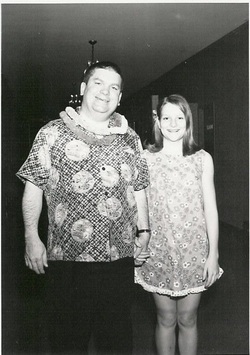 There have been many people who have profoundly influenced my faith, but none more than my father, Richard Benefield, aka "The Jolly Fat Man of the Hotel Magee." Dad was a hotel manager and caterer whose worked tirelessly 7 days most weeks. He prepared me for the minister's life by working every weekend. But for him, work was not the center of his life, faith was. My Dad's favorite verse of the Bible was Romans 12:1: "I appeal to you therefore, brothers and sisters, by the mercies of God, to present your bodies as a living sacrifice, holy and acceptable to God, which is your spiritual worship." He found his particular calling later in the chapter, "We have gifts that differ according to the grace given to us: prophecy, in proportion to faith; ministry, in ministering; the teacher, in teaching, the exhorter, in exhortation; the giver, in generosity; the leader, in diligence; the compassionate, in cheerfulness." God gave my Dad and abundance of most these gifts, though he considered he was especially blessed to be a generous giver. One of the things my Dad used to say, which has been a guiding light for my own life, is: "If you love to serve others, you will always have something important to do and you will always be happy." He loved to serve his church, his community, and God's creation, and it made him a very happy man. I remember when I was 12 years old, I went to the First Presbyterian Church of Bloomsburg, PA, for a worship service in which my Dad, an elder of that church, was installed as Moderator of Northumberland Presbytery. On Tuesday night, when I was installed as Moderator of Monmouth Presbytery, surrounded by my family and so many wonderful friends from United Presbyterian Church and the Monmouth Presbytery, I knew that my Dad was one of that "great cloud of witnesses" cheering us on from heaven (Hebrews 12:1). My father was the one who helped light the torch of my faith, the Light of Christ that illumines my path in life and inspires me to share Christ's love and light with others. My prayer is that we might be the kind of Christians whose love for Christ and service for others inspires generations to come, just as my father's did.
5 Comments
 Acts 1:6-14 This passage in Acts is about the Ascension of Christ into Heaven. Ascension Day is forty days after Easter – and ten days before Pentecost. And, of course on Pentecost we celebrate the out pouring and indwelling of the Holy Spirit – the act by which God empowered the church for its mission in the world. In contrast, this Scripture passage involves a period of waiting -- It is a short and unusual time for the fledgling Christian community: Christ has ascended into heaven – His earthly ministry has been completed. But the Holy Spirit has not yet descended upon the church to empower it and inspire its mission. The fledgling Christian community is not yet the church in a real sense – that will not happen until Pentecost. Instead – we see a small group of believers waiting for God – waiting for help and his instruction about what to do next in life. I think we have all been in a situation like that. What do you do when you are waiting for God to act? Here are some thoughts on how we can faithfully wait for God. First, hold onto the promises of the Scripture: God will act in His time. Jesus told the disciples: “It is not for you to know the times or the dates that the Father has set by his own authority.” It is hard to wait. We do not want to wait. We want to speak with God on our time – not on his. We want him to act – Now!!! We want God to act on our time – not on His. God will act – He always does – In his way – In his time – In His wisdom. Isaiah the Prophet reminds us: “As the rain and the snow come down from heaven and do not return to it without watering the earth and making it bud and flourish, so that it yields seed for the sower and bread for the eater, so is my word that goes out from my mouth: It will not return to me empty, but will accomplish what I desire and achieve the purpose for which I sent it. And you will go out in joy and be led forth in peace.” Isaiah reminds us that the Lord has his time. The Lord will act in his time. The Lord will restore all things in his time. Second, waiting for God should be a time of practical activity. The Book of Acts tells us that the disciples took care of some business. After Christ had ascended, Peter tells the disciples that they needed to replace Judas – to appoint a new disciple. So, they went about in a business-like fashion – They created a job description: The new disciple was to be a witness to the resurrection of the Christ. They specified the qualifications: The new disciple had to be a person who had been with them from the beginning. The disciples then looked at the candidates: There were two who fit the bill. Finally, the disciples took the practical step of invoking God in their decision making process: By casting lots they allowed God to chose between the two qualified candidates. Our own times of waiting for God should also be a very practical time. If we are waiting for God to solve the problem of starvation in Africa – we can also be doing something practical: We can give what we are able; we can support those who are there in Africa to bring relief; we can pray like the disciples. All of those things are very practical. If we are waiting for God to provide direction in our life activities – we can do something very practical while we wait: we can investigate our options; we can get the proper training; we can talk to other people, listening to their suggestions; e can pray for guidance. All of those things are very practical. Third, the time of waiting should be a time of reflection. I imagine that the disciples used the ten day period from the Ascension to Pentecost for reflection on all of the events they had witnessed and experienced. Imagine for a moment that you are Peter. I imagine Peter during this time of waiting like this: God has promised that there will be great things in the future. But for now Peter is waiting for the Holy Spirit. Perhaps Peter thought back on his time with Jesus. Time and again, the Gospels tell us that along the way there was so much that Peter did not understand. Peter made mistakes; he was confused. And yet for all of the mistakes that Peter made, Christ still trusted him. Christ was still determined to use him. Peter had so much to contemplate. It was necessary for Peter to have that time of reflection before he went on to the next big set of assignments that God had in mind for him: leading the Jerusalem church, converting Gentiles, traveling to Rome to lead the church there, to become the first bishop of Rome, and going to a martyr’s death. The waiting time provides a wonderful opportunity to stop, to reflect, to gain some perspective on what has happened in life. Finally, the time of waiting can be a time to deepen our faith. That gets us to the final example set for us by Peter and the other apostles. God helps us build faith in many ways, but one way is in our communion with the Lord and with each other. As they began their period of waiting – the days between Ascension and Pentecost – they ate with our Lord. They heard our Lord and were built up in their faith in this communal experience. And in the same way faith is built in us in the sacrament of communion. As we wait for the Lord to act within our lives, let us wait with him and with the Body of Christ as we come to the Lord’s table. This is a sacred meal of which we partake. In the sacrament of communion we dine with the Lord as surely as did the disciples. Our faith is built in these holy moments. Wait for the Lord. You won't be disappointed. |
Rev. Dr. Shannon SmytheUnited Presbyterian Church Archives
March 2023
Categories |
Address 12 Yardville-Hamilton Square Road, Yardville, NJ 08620 Phone 609-585-5770 Email [email protected]

 RSS Feed
RSS Feed